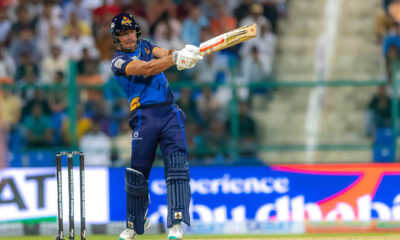MI Emirates’s run riot crafted by their skipper Nicholas Pooran and Andre Fletcher’s half centuries, which produced the highest total this season, blew away Dubai Capitals by 45 runs to emerge as the new champions of the DP World ILT20 Season 2.
In front of a packed Dubai International Stadium, Pooran scored a breezy unbeaten captain’s knock of 57 runs off 27 balls studded with six sixes and two boundaries. He was backed by Fletcher’s 53 off 37 balls, featuring four sixes and three boundaries. Openers Muhammad Waseem and his partner Kusal Perera contributed aggressively, with Waseem scoring 43 off 24 balls, including three boundaries and three sixes, and Perera adding 38 off 26 balls, with six boundaries, leading to a 77-run opening partnership and helping MI Emirates set a record score of 208 for 3 in 20 overs.
In reply, Capitals could muster only 163 for 7 in 20 overs with Trent Boult and Vijayakanth Viyaskanth bagging two wicket each. MI Emirates received the winners’ prize of a whopping $700,000 (USD) while the runners-up received $300,000 (USD).
Chasing the mammoth total, Capitals had it tough from the start with Emirates’ Akeal Hosein, who has been regularly striking in the first over, trapping Leus du Plooy leg before, resulting in a duck. Tom Abell, when on 7, was dropped by Dwayne Bravo at mid-off by Trent Boult, but was later caught by Pollard off Rohid Khan for 14. Banton and his skipper Sam Billing pushed the score to 63 when Banton got foxed by leg spinner Vijayakanth Viyaskanth to be stumped by Pooran for 35.
Sikandar Raza, who has played many match-winning knocks for Capitals, scored just 10 runs before hitting Viyaskanth to Waseem at deep mid-wicket. Capitals, faced with the challenge of scoring 100 runs in 41 balls, saw Waqar Salamkheil remove Billings stumped by Pooran for a fighting 40. Trent Boult then struck twice to remove Rovman Powell caught by Waseem at deep midwicket and clean bowl Jason Holder for 24 to ensure his team’s victory.
Earlier, Capitals won the toss and elected to bowl. MI Emirates’ opener Waseem started with a six over long-on off Scott Kuggeleijn, while his partner Kusal Perera played some flowing drives. The pair reached their half-century partnership in 3.3 overs, with Waseem hitting two boundaries and a six off Kuggeleijn in that over. By the end of the powerplay, MI Emirates had posted 72 runs. Waseem fell to Zahir Khan when he was seven short of his half-century, lifting Zahir Khan to Rovman Powell at mid-off.
Andre Fletcher maintained the run flow with Perera and steered the total to the 100-run mark in 10.5 overs. At the score of 102, Leus du Plooy pulled off a diving catch at deep mid-wicket to dismiss Perera, who attempted a slog sweep off Sikandar Raza, for 38.
Spinners Raza and Zahir Khan tried to strangle the run flow, but skipper Nicholas Pooran and Fletcher hit sixes off them. They put on a 50-run partnership in 28 balls and took the score past the 150-run mark in 15.5 overs. Another spectacular diving catch by Du Plooy at backward square leg to Fletcher’s top-edged pull ended the 56-run partnership.
Kieron Pollard joined Pooran, who smashed Jason Holder for 19 runs in the 18th over with two towering sixes and a boundary. With the score reading 177 for 3 and two more overs to go, the crowd got ready to cheer for the 200-run mark. Emirates achieved it off the fifth ball of the last over through a six from Pooran. This six also helped him reach his half-century in 26 balls. In the last five overs, Emirates hit 74 runs.
James Vince of Gulf Giants with 356 runs from 12 innings emerged the highest run-getter to win the Green Belt, while Waqar Salamkheil with 17 wickets was the highest wicket-taker and bagged the White Belt on better economy rate pipping Fazalhaq Farooqi, who too had 17 wickets. Muhammad Waseem won the Blue Belt for the best UAE player for the second year is succession. Sikandar Raza bagged the Red Belt for the Most Value Player. All of them pocketed USD 15,000 each. DP World Biggest six was awarded to Andre Fletcher while DP World Most 6s of the season was won by Nicholas Pooran. The Cycle Hub Catch of the season went to Sam Billings for his one-handed effort at the slip to dismiss Will Smeed in Match No2.
MI Emirates’ skipper Nicholas Pooran, after receiving the Player of the Match, hailed his openers for setting the stage for the victory. “Truly special to be the man of the match in the final. We spoke about having the right energy and attitude. I couldn’t have asked for a better start, they (openers) did the hard work, we just finished it off. It’s about understanding the situation and batting accordingly.”
Losing captain Sam Billings was sporting in his defeat and said: “Always regret when you lose. As captain, I’m go to bed thinking where it went wrong. But they were brilliant, Nicholas Pooran in that mood is very difficult to play against. Maybe they scored 20-25 runs too many. One of the best things about playing cricket in different places is experiencing different cultures. The UAE players have all been impressive. Really happy to see them improve.”
Sikandar Raza who won the most valuable player award said: “Quite a proud and humbling moment for me. It has been a journey, it is the reward for a lot of sacrifice, hard work, and pain. I just want to say thank you to all those who have prayed for me in these last two years, especially during my illness. I like to be in the position where the skipper can bank on me to bowl four overs every time. Thirteen wickets in the tournament feels like the hard work is coming through; we can only get better.”
























